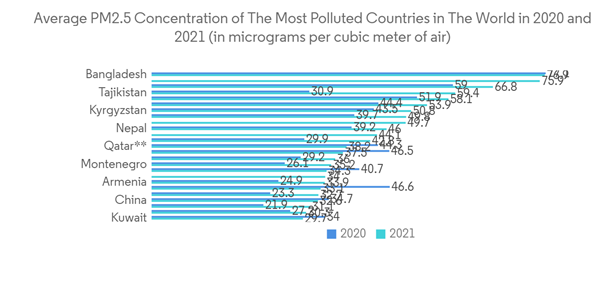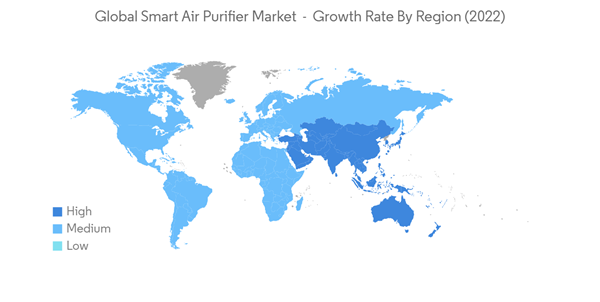The smart air purifier is a modern version of a traditional air purifier that automatically filters the air for various end users. It can be controlled remotely by using an app on smartphones linked to smart air purifiers via wireless networks like Wi-Fi and Bluetooth. The main advantage of the smart air purifier is that customers can monitor and manage indoor air quality and adjust basic settings via smartphones. Additionally, these gadgets collect information on air quality from specialized monitoring sensors, automatically clean the air in accordance with that data, and alert users when air quality levels change.
Users can manage these purifiers by fine-tuning the air-cleaning settings using apps designed for smartphones. Smart air purifiers are mostly used and installed in indoor settings, including homes, small businesses and industrial buildings, and automobiles. Smart air purifiers come with technology that automatically removes smoke, dust, and fumes from the air. These gadgets come in versions that release air scented with safe chemicals that can enhance the ambiance and aroma of the environment.
Because of the COVID-19 pandemic, many companies in the smart air purifiers industry were forced to temporarily halt operations in order to comply with new government regulations aimed at preventing disease spread. This halt in operations had a direct impact on the revenue flow of the air filter market. Furthermore, due to a lack of raw materials and workers during the lockdown, industrial product production has ceased. Furthermore, no new consignments were received by businesses in this industry. As a result, the suspension of industrial activities and subsequent lockdown for several months had an impact on smart air purifier market share, and the market is expected to recover slowly during the projection period.
Urban areas have become much more polluted as a result of fast urbanization and increased construction activities. The need for smart air purifiers is being driven by the requirement for clean, odorless, dust- and smoke-free air in the environment. People are now more technologically oriented, and considerable investments in high-end technological items are anticipated to be positive signs for the expansion of the global economy. Due to rising per capita income and spending on medical equipment, it is projected that sales of these air purifiers would continue to climb in the near future.
High maintenance costs, frequent filter replacement, and premium installation fees have made air purifiers an overpriced expensive gadget, impeding market growth in the forecasted period.
Smart Air Purifier Market Trends
Increasing Pollution in Developing Countries Driving the Market
The pollution levels in developing nations like China and India are exceedingly high, and many regions in these nations have exceptionally high air quality index readings. In order to at least maintain clean and fresh indoor air, residents of certain localities are expected to install air purifiers in their houses.Due to the increased demand for anti-pollution products, as pollution levels rise, the market is anticipated to grow. In the near future, product use is anticipated to increase in emerging nations due to the increased prevalence of airborne illnesses. Using an air purifier to purify the air also aids in cleaning the rest of the house. The airborne particles that make up dust include pollen, mold spores, dust mites, human skin cells, hair, and insect debris; these particles may be captured by air purifiers equipped with a HEPA filter.
Asia-Pacific Held the Largest Share in the Market
The Asia-Pacific region has the largest market share, followed by North America and Europe. The region's rapidly growing industrialization is driving market demand. The major markets in the Asia Pacific are Qatar, the United Arab Emirates, China, and India. Rising pollution levels are also expected to drive Market expansion. Furthermore, economic development that leads to a healthier lifestyle has a positive impact on market growth. The Middle East is expected to contribute significantly to the rest of the world during the forecast period.Furthermore, due to the growth in pollution levels in various nations, Asia-Pacific now holds a monopoly on the market for smart air purifiers. During the course of the projection period, an increase in policies like the graded air quality rating response system and emission-reducing converters for cars will also help the market for smart air purifiers develop. Due to a surge in health consciousness, North America is expected to have considerable growth in the smart air purifier market. Furthermore, it is projected that the region's market for smart air purifiers would rise in the next years due to the tight government rules intended to raise the standards for air quality.
Smart Air Purifier Industry Overview
The global smart air purifier market is fragmented due to the presence of a large number of global and regional players in the market like Sharp Corporation, Dyson Limited, Xiaomi Corporation, Honeywell International, Inc., Hamilton Beach Brands, Inc., Koninklijke Philips N.V., and LG Electronics, Inc., among others. Manufacturers are introducing new products in the market using new technologies. The companies use various marketing strategies to increase their market shares. Some of the market's leading players are heavily investing in research and development activities to improve their position in current electronic technologies and processes in order to increase efficiency and lower costs.Additional Benefits:
- The market estimate (ME) sheet in Excel format
- 3 months of analyst support
This product will be delivered within 2 business days.
Table of Contents
Companies Mentioned (Partial List)
A selection of companies mentioned in this report includes, but is not limited to:
- Sharp Corporation
- Dyson Limited
- Xiaomi Corporation
- Honeywell International, Inc.
- Hamilton Beach Brands, Inc
- Koninklijke Philips NV
- LG Electronics, Inc.(LG Corp)
- Havells India Ltd.
- Sunbeam Products Inc.
- Coway Co., Ltd.
- Levoit (Vesync Co., Ltd.)
- Unilever PLC (Blueair AB)
- Smart Air Filters Pvt Ltd.
- Whirlpool Corporation
- Winix Inc.*










